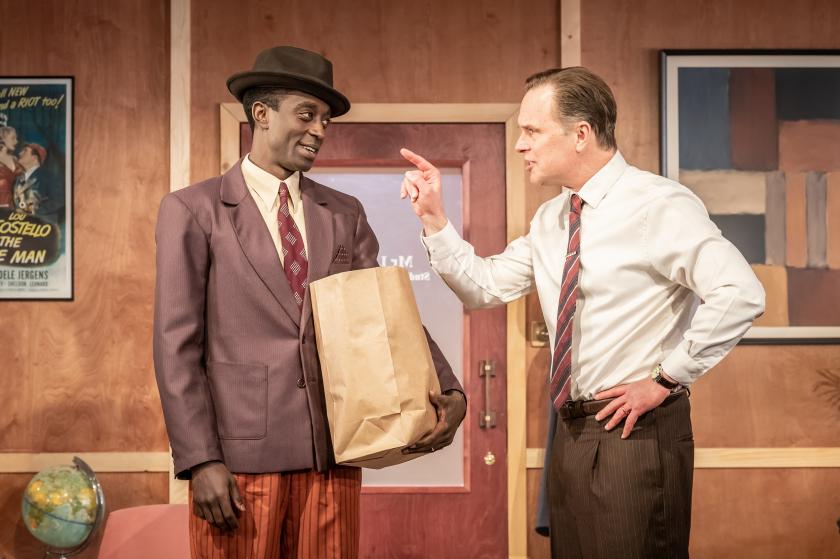Before he became Mr Tibbs and Hollywood’s leading Black statesman, Sidney Poitier was a rising star at possibly the worst point in American history for the entertainment industry. McCarthyism was “cancelling” careers at the say-so of stoolies’ gossip, and in parallel the civil rights movement was producing defiant Black leaders and scaring the studios rigid at the idea of hiring Black talent.
Enter Poitier, the man the TV networks saw as the acceptable face of Black culture for mainstream American audiences (pictured below right). The moment his career was threatened by the collision of these forces has been reimagined by Ryan Calais Cameron, writer of the hit play For Black Boys Who Have Considered Suicide When the Hue Gets Too Heavy.
Retrograde had its origins in 2018, when Poitier was still alive, but ailing (he died in 2022); he gave it his blessing. Now that his friend and fellow Black champion Harry Belafonte has also passed away, the play couldn’t find a more auspicious time to air its issues.
 Calais Cameron has squeezed a whole era of arguments – still rumbling on as the culture wars – into its 90 minutes, with just one continuous real-time scene and three characters. We are in the office of NBC lawyer Mr Parks (main picture). Calais Cameron can’t resist giving him Larry as a first name, echoing the name of the actor who caved before McCarthy’s bullies and became synonymous with the fruits of betrayal as his career fizzled out. But they all call this lawyer “Mr Parks”.
Calais Cameron has squeezed a whole era of arguments – still rumbling on as the culture wars – into its 90 minutes, with just one continuous real-time scene and three characters. We are in the office of NBC lawyer Mr Parks (main picture). Calais Cameron can’t resist giving him Larry as a first name, echoing the name of the actor who caved before McCarthy’s bullies and became synonymous with the fruits of betrayal as his career fizzled out. But they all call this lawyer “Mr Parks”.
That it’s the 1950s (1955, to be precise) is signalled by the hardwood modern furniture and a big sunburst clock, whose ticking becomes ominously louder as events get tenser. It's also signposted by the fact that Parks (Daniel Lapaine) and his visitor, a jittery little writer called Bobby (Ian Bonar), are drinking scotch, Mad Men style, at 10.30 in the morning. (Bobby is presumably a version of screenwriter Robert Alan Aurthur, who did write a script his friend Poitier was keen to play the lead in and would go on to co-write All That Jazz with Bob Fosse.)
Bobby has come to steer Poitier through the signing of a studio contract that will set him (and Bobby) up for life. After his breakthrough in The Blackboard Jungle, the 28-year-old actor still hasn’t been earning enough to support his growing family so has opened a ribs joint in Harlem. The new role, as a NYC docker, would make him the first Black actor to get top billing in a primetime TV drama. The NBC head honchos were amazed to discover that their bright new prospect was, gulp, Black.
But the intemperately wise-cracking, ribald Parks, all Mr Congeniality on the surface, has a hidden agenda, which amounts to nothing less than Poitier agreeing to very publicly betray the man he admires the most in the whole world. He also has to sign a loyalty oath to maintain “American” values and not do anything controversial that makes the studio look bad. In other words, he must forget his activist friends and their work, lie low, stay out of politics, at precisely the moment he knows there is a “whole movement” to be tapped. The second half of the play, with the clock ticking away, focuses on how he handles this hustle from Parks, who is threatening both him (and Bobby) with a subpoena to a House UnAmerican Activities Committee appearance if he doesn’t sign. Will he? Is Parks bluffing?
This is a great plot-line in itself, but Calais Cameron really fires it up with dialogue for Parks that sounds like he’s channelling one of Dalton Trumbo’s streetwise guys. I am assuming this was deliberate as Trumbo was one of the blacklisted Hollywood Ten. The zinging one-liners and turns of phrase come snapping from his motormouth, limning out his bigotry, his near-nihilism and especially his cynical pragmatism. Isn’t it better to play a maid than be a maid, he asks Poitier, quoting Hattie McDaniel’s 1939 Oscar speech – and gets her name wrong. He also thinks Poitier’s breakthrough film was The Black Boys’ Jingle.
Parks represents everything negative Poitier, and any Black performer, must contend with, the company man with a latent racism and no allegiance to anything except his job. Here Poitier is allowed to call him out for terms like “your people” and to ridicule his stereotyping nonsenses: “Would you have preferred my character as a foot-shuffling man with a watermelon-eating smile?”
Daniel Lapaine gives a bravura, mercurial performance as Parks, a perma-smiling scumbag who can move from witty to ferocious on a dime. As his opponent, Ivanno Jeremiah’s nattily dressed Poitier is his opposite, measured and contained, a man who much prefers tap water to scotch at 10.30am. Jeremiah catches the actor’s obvious dignity but also his larkier side, both the beautiful baritone voice and the cheeky facial expressions. HIs soul-searching about signing the oath is painful to watch. Finally giving way to volcanic anger, he delivers his impassioned final speeches to spontaneous applause from the audience.
The last of these speeches contains a chunk of dialogue, complete with hand gestures, from A Man Is Ten Feet Tall, the live-recorded 1955 TV play of Aurthur’s for Philco Playhouse Theatre that Poitier did go on to make, his name topping the cast list. You can find it on YouTube. Two years later the script had morphed into the film Edge of the City. This rousing production is a fitting tribute to Poitier and all the other Black performers who opened the door.
- Retrograde at the Kiln Theatre until May 27
- More theatre reviews on theartsdesk



Add comment